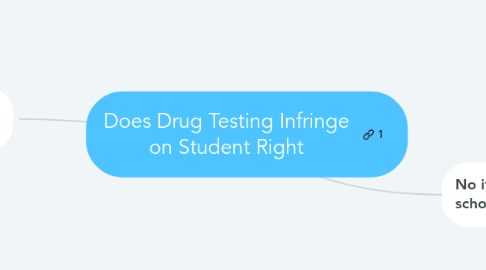
1. Yes it infringes on privacy and it doesn't always work
1.1. Because students don't like being drug testing, student to teacher relationships decline.
1.1.1. Nelson says that "Drug testing still is found not to be associated with students' reported illicit drug use—even random testing that potentially subjects the entire student body. Testing was not found to have significant association with the prevalence of drug use among the entire student body nor the prevalence of use among experienced marijuana users. Analyses of male high school athletes found that drug testing of athletes in the school was not associated with any appreciably different levels of marijuana or other illicit drug use"("School").
1.1.1.1. Drug testing didn't help find people who were using drugs.
1.1.2. David E. Nelson explains "Opponents of student drug testing aren't limited to reform organizations. Not surprisingly, high school students themselves and their parents form another bloc where opposition can and does emerge. Kern reported being contacted by numerous students and parents as drug testing becomes an issue in their communities." ("School").
1.1.2.1. the resort to random drug testing of junior and senior high school students has also sparked a counter-movement that tries to persuade schools to instead embrace drug prevention strategies that do not treat students as guilty until proven innocent.
1.1.2.2. Students don't want to be drug tested because it makes them feel like theyre criminals.
1.2. Because drug testing scares kids away from extracurricular activities it doesn't decrease drug use.
1.2.1. Dr. Loyd D. Johnston explains "[As a result of drug testing,] students may turn to more dangerous drugs or binge drinking. Because marijuana is the most detectable drug, students may switch to drugs they think the test will not detect, like Ecstasy (MDMA) or inhalants. Knowing alcohol is less detectable, they may also engage in binge drinking, creating greater health and safety risks for students and the community as a whole...." (Appel).
1.2.1.1. Drug testing only covers some drugs and in order to not get caught kids might use more serious undetectable drugs.
1.2.2. Acorrding to Dr Loyd D. Johnston. "Research also shows that students who participate in extracurricular activities are: Less likely to develop substance abuse problems; Less likely to engage in other dangerous behavior such as violent crime; and More likely to stay in school, earn higher grades, and set—and achieve—more ambitious educational goals." (Appel).
1.2.2.1. Studies show that drug testing doesn't help schools have less of a drug problem.
1.2.2.2. Since drug testing might stop kids from participating in extracurricular activities it could cause kids to loose these ideas.
2. No it helps keep drug use in schools down
2.1. Because drug testing causes students to do better in school, kids go to better colleges.
2.1.1. According to Evans "New Jersey provides clear evidence that refutes the claims of negative effects of RSDT on students and school culture. Schools with RSDT programs send a clear message about drug and alcohol use, provide students with opportunities to avoid drug and alcohol use, [and] provide a means for identification and early intervention in student drugs and alcohol use. These programs contribute to a nurturing environment that allows students to flourish and to participate in the educational process."(Edwards).
2.1.1.1. Drug testing helps make students flourish and do better in school.
2.1.2. A study shows that "This data clearly refutes assertions that students attending schools with RSDT programs experience a loss of connectedness with their schools as measured by indicators such as student performance on standardized tests, daily attendance, graduation, suspension, expulsion and dropout rates"(Edwards).
2.1.2.1. Dug testing has been proven that drug testing doesn't negatively affect student to teacher relationships.
2.1.2.2. There is lots of evidence that drug testing helps schools yet people still feel that they do not.
2.2. Because drug testing helps bring down violence in schools, kids feel safer.
2.2.1. David G. Evans says that "A 1997 CASA survey revealed that high school students see more drug deals at school than in their neighborhoods. In the survey, 76% of high school students claim that drugs are kept, used, or sold on school grounds. In addition, 29% of high school students claim that a student in their school died from a drug- or alcohol-related incident in the past year."(Evans).
2.2.1.1. Using drug testing to stop drug testing would help lessen drug related deaths and make even outside of school safer.
2.2.1.2. Its important that schools make going to school safe the presence of drugs makes school no longer safe.
2.2.2. Evans explains that "According to a study in the Journal of the American Medical Association, students who use drugs are more likely to bring guns and knives to school, leading to school violence. According to the New Jersey Department of Education report, assaults are up 30% with school staff as victims in 19% of the cases." (Evans).
2.2.2.1. If you can stop kids from using drugs you could help make schools safer.

